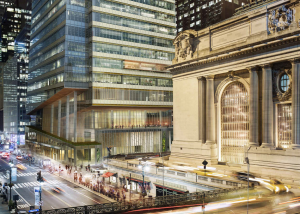
Architect’s rendering of One Vanderbilt Place and Grand Central Terminal. Image credit: Kohn Pedersen Fox Associates
Owner of Grand Central Terminal claims violation of property rights, seeks $1 billion in damages. On September 28, 2015, Andrew Penson—the owner of Grand Central Terminal in the Midtown East neighborhood of Manhattan—initiated a lawsuit against New York City for allegedly unlawfully taking Grand Central’s air rights from him for the benefit of SL Green Realty Corporation without just compensation, which is a violation of the Fifth Amendment of the United States Constitution. The complaint was filed with the United States District Court in Manhattan and seeks $1.13 billion in damages.
Penson, president and founder of Argent Ventures, purchased Grand Central for $80 million in 2006. He had purchased the air rights for less than $60 per square-foot, but claims that the value of the air rights have risen to $880 per square-foot. He had previously engaged in negotiations with SL Green for the purchase of Grand Central’s air rights, but negotiations failed when SL Green decided that the cost of the air rights was too expensive.
In 2015, the City Council approved SL Green’s application to build a commercial skyscraper called One Vanderbilt. The skyscraper would be located next to Grand Central and would reach over 1,400 feet tall, which, as described in Penson’s complaint, “would be one of the world’s tallest buildings, dwarfing the Empire State Building and far exceeding the density permitted as-of-right by local zoning.”
SL Green was granted the authority to construct this 65-story building in exchange for its investment of $220 million in improvements to the subway station below Grand Central. Penson’s complaint alleges that prior to the rezoning at issue, SL Green would not have been able to build One Vanderbilt without first acquiring the “transferable development rights” connected with the landmarked Grand Central Terminal and also investing in significant improvements to the subway station below Grand Central. The rezoning, according to the complaint, created a way for SL Green to follow through with its plans for One Vanderbilt without having to purchase the transferable development rights from Penson.
In a statement issued to Cityland, Jonathan Rosen, spokesman for SL Green, commented on the broad community and governmental support backing the One Vanderbilt project because of its promise to improve the commuting experience for New Yorkers and add a brand new, state-of-the-art office building to East Midtown. “We are already hard at work delivering on those commitments and won’t be sidetracked by frivolous litigation,” said Rosen.
The Department of City Planning explained the rationale behind the controversial zoning text amendment:
DCP [proposed] the Vanderbilt Corridor text amendment in order to address the number of development sites along Vanderbilt Avenue that offer the opportunity to provide modern commercial space in the immediate vicinity of Grand Central Terminal in the near term, to create a mechanism for linking new commercial development to significant transit and public realm improvements in the overall Grand Central Terminal area, and to provide greater options for the transfer of unused landmark development rights.
By: Jessica Soultanian-Braunstein (Jessica is the CityLaw Fellow and a New York Law School graduate, Class of 2015)

